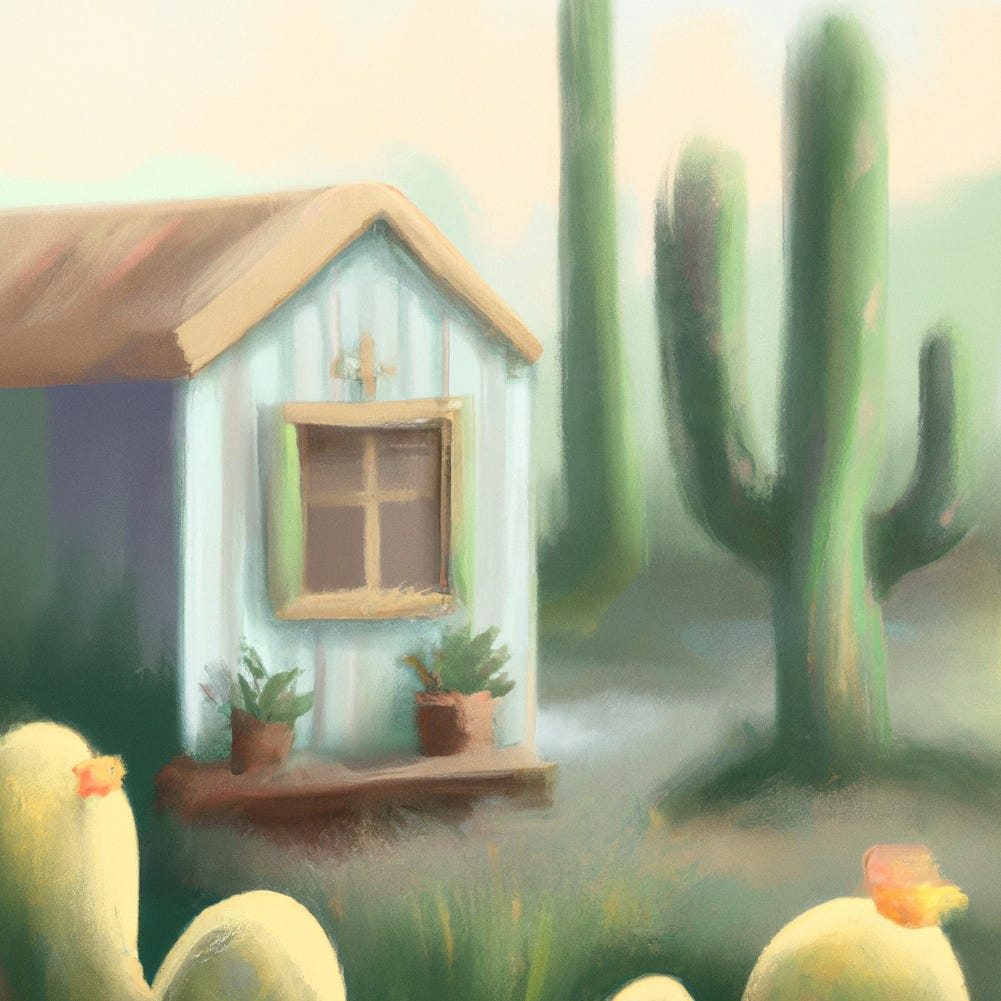Submerge into Stillness
The Elusive Reset from the Modern World
We drove along the dirt road, cacti emerging behind layers of arid brush. Turning right at the blue sign, the car listlessly wove through a couple campsites. Around the bend we saw our home for the day, a little teal cabin auspiciously titled “The Library.”
Josh, a close friend, collaborator, and one of my chosen family, was behind the wheel. Bringing the car to a stop and opening the doors, we breathed deeply and smiled widely. The weekend had begun.
Arriving here after the previous work week, our heads were filled with a frantic buzzing energy. The faint but distinct odor of smoldering burnout lingered on us. Deadlines, pull requests, and results of self-imposed “creative time” swam through my head unbidden.
This state isn’t uncommon in our modern world. We decided to answer it with a tried and true antidote: a “retreat” into nature, books, and writing.
Over the next hours, we meditated, journaled, read, found corners of the cabin to explore, watched a tree, walked along a trail, ran away from an unfriendly wasp, started a fire, cooked tacos for dinner, and committed ourselves to following our internal compasses for whatever we wanted to do next.
While none of this is particularly special, the day was completely rejuvenating.
Finding Your Stillness
It feels mad to me that it’s so hard, particularly in highly developed nations, to find space and time for stillness.
We’ve traded our presence for the pursuit of more. We’re accustomed to needing, wanting, and chasing after more. More money, more stuff. The chase of more-ness and the abandonment of enough-ness is a default mentality of the modern world, one that’s rarely questioned.
In moments when we do question it, we’ll find that our societal definition of “value” is subtly misaligned. The workings of our economy incentivize constant consumption and an endless pursuit of growth. We don’t attribute a hard-coin value to the feeling of enough-ness. We’ve been converting the gifts that we would once give each other into anonymous transactions — creating separation when we could be fostering community.
There’s a complicated web of factors at work here, a crisscrossing of usury, dopamine triggers, globalization, algorithms and fiscal policy. It’s a web I’ve been trying to untangle for myself — searching for understanding in spirituality, history, technology, and my lived experiences.
For the purpose of this essay, one thing is clear. Accounting neglects a line item in the balance sheet of life: the cost of a mind dizzied by the modern world.
And yet, there is a way to reclaim our lost presence. It’s nothing particularly fancy or expensive. All it takes is finding a place that cultivates an intentional stillness.
As you craft this space for yourself, you might find the following helpful:
You don’t have to go anywhere physically, although a new environment might help to reset you.
Use constraints generously. Turn off your phone. Keep away from screens. Find a small area and invite solitude.
Choose a time frame for your stillness that feels long enough to be significant to you.
“Significant” doesn’t necessarily mean long in a strict time measurement. I was meditating, reading, and journaling for less than 24 hours. I returned home feeling like I had been resting for a whole week.
Welcome nature into your space. Natural surroundings can be an inspiration.
Through the quiet, we can ditch the minutiae of small, short term problems and reorient ourselves to the bigger picture.
That evening, the chorus of crickets rose into a crescendo as our fire blazed with light. We laughed about how they were as loud as the city. The flames danced before our transfixed gaze, and sparkles of stars silently burst to life in the night sky. Even with the cricket orchestra at full volume, there was peace.



This was excellent Saalik. Such a powerful message about creating stillness and I love the suggestions you provided to cultivate more stillness in your day. Awesome work :)